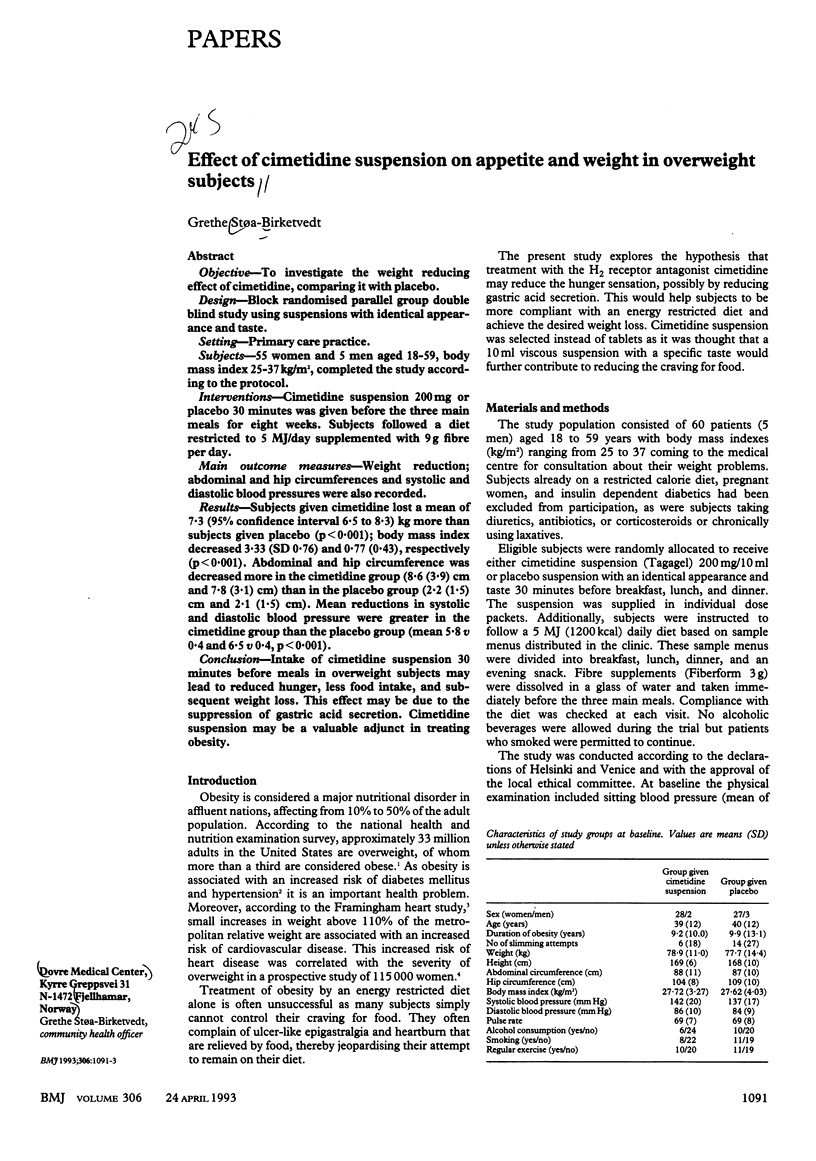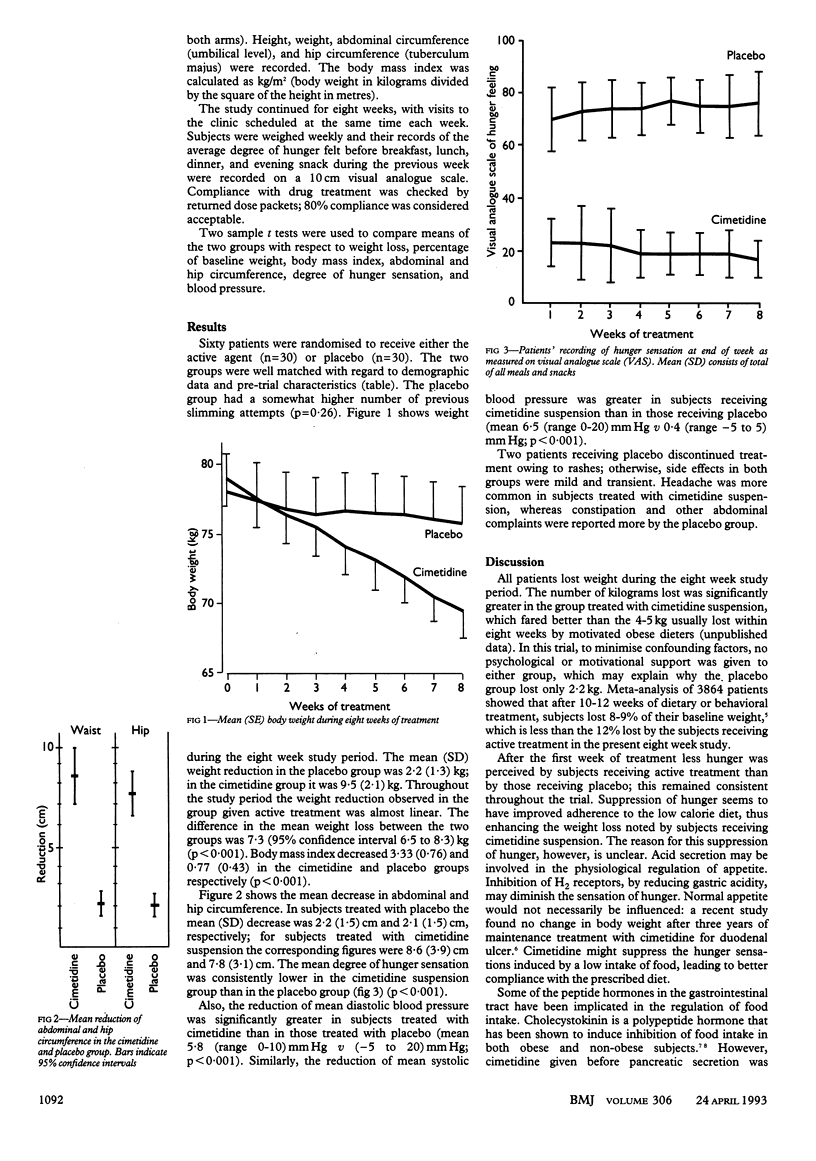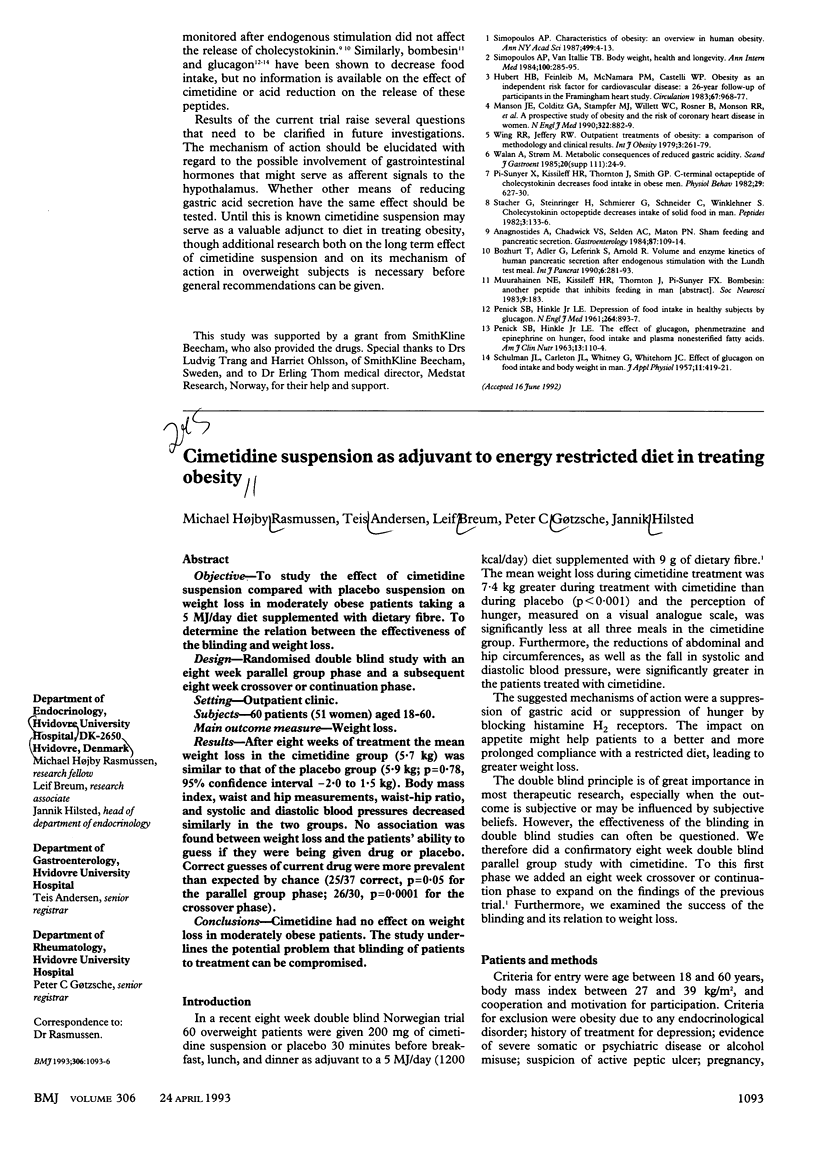Abstract
OBJECTIVE--To investigate the weight reducing effect of cimetidine, comparing it with placebo. DESIGN--Block randomised parallel group double blind study using suspensions with identical appearance and taste. SETTING--Primary care practice. SUBJECTS--55 women and 5 men aged 18-59, body mass index 25-37 kg/m2, completed the study according to the protocol. INTERVENTIONS--Cimetidine suspension 200 mg or placebo 30 minutes was given before the three main meals for eight weeks. Subjects followed a diet restricted to 5 MJ/day supplemented with 9 g fibre per day. MAIN OUTCOME MEASURES--Weight reduction; abdominal and hip circumferences and systolic and diastolic blood pressures were also recorded. RESULTS--Subjects given cimetidine lost a mean of 7.3 (95% confidence interval 6.5 to 8.3) kg more than subjects given placebo (p < 0.001); body mass index decreased 3.33 (SD 0.76) and 0.77 (0.43), respectively (p < 0.001). Abdominal and hip circumference was decreased more in the cimetidine group (8.6 (3.9) cm and 7.8 (3.1) cm) than in the placebo group (2.2 (1.5) cm and 2.1 (1.5) cm). Mean reductions in systolic and diastolic blood pressure were greater in the cimetidine group than the placebo group (mean 5.8 v 0.4 and 6.5 v 0.4, p < 0.001). CONCLUSION--Intake of cimetidine suspension 30 minutes before meals in overweight subjects may lead to reduced hunger, less food intake, and subsequent weight loss. This effect may be due to the suppression of gastric acid secretion. Cimetidine suspension may be a valuable adjunct in treating obesity.
Full text
PDF


Selected References
These references are in PubMed. This may not be the complete list of references from this article.
- Anagnostides A., Chadwick V. S., Selden A. C., Maton P. N. Sham feeding and pancreatic secretion. Evidence for direct vagal stimulation of enzyme output. Gastroenterology. 1984 Jul;87(1):109–114. [PubMed] [Google Scholar]
- Bozkurt T., Adler G., Leferink S., Arnold R. Volume and enzyme kinetics of human pancreatic secretion after endogenous stimulation with the Lundh test meal. Int J Pancreatol. 1990 Jun;6(4):281–293. doi: 10.1007/BF02924407. [DOI] [PubMed] [Google Scholar]
- Hubert H. B., Feinleib M., McNamara P. M., Castelli W. P. Obesity as an independent risk factor for cardiovascular disease: a 26-year follow-up of participants in the Framingham Heart Study. Circulation. 1983 May;67(5):968–977. doi: 10.1161/01.cir.67.5.968. [DOI] [PubMed] [Google Scholar]
- Manson J. E., Colditz G. A., Stampfer M. J., Willett W. C., Rosner B., Monson R. R., Speizer F. E., Hennekens C. H. A prospective study of obesity and risk of coronary heart disease in women. N Engl J Med. 1990 Mar 29;322(13):882–889. doi: 10.1056/NEJM199003293221303. [DOI] [PubMed] [Google Scholar]
- PENICK S. B., HINKLE L. E., Jr Depression of food intake induced in healthy subjects by glucagon. N Engl J Med. 1961 May 4;264:893–897. doi: 10.1056/NEJM196105042641801. [DOI] [PubMed] [Google Scholar]
- PENICK S. B., HINKLE L., Jr THE EFFECT OF GLUCAGON, PHENMETRAZINE AND EPINEPHRINE ON HUNGER, FOOD INTAKE AND PLASMA NONESTERIFIED FATTY ACIDS. Am J Clin Nutr. 1963 Aug;13:110–114. doi: 10.1093/ajcn/13.2.110. [DOI] [PubMed] [Google Scholar]
- Pi-Sunyer X., Kissileff H. R., Thornton J., Smith G. P. C-terminal octapeptide of cholecystokinin decreases food intake in obese men. Physiol Behav. 1982 Oct;29(4):627–630. doi: 10.1016/0031-9384(82)90230-x. [DOI] [PubMed] [Google Scholar]
- SCHULMAN J. L., CARLETON J. L., WHITNEY G., WHITEHORN J. C. Effect of glucagon on food intake and body weight in man. J Appl Physiol. 1957 Nov;11(3):419–421. doi: 10.1152/jappl.1957.11.3.419. [DOI] [PubMed] [Google Scholar]
- Simopoulos A. P. Characteristics of obesity: an overview. Ann N Y Acad Sci. 1987;499:4–13. doi: 10.1111/j.1749-6632.1987.tb36193.x. [DOI] [PubMed] [Google Scholar]
- Simopoulos A. P., Van Itallie T. B. Body weight, health, and longevity. Ann Intern Med. 1984 Feb;100(2):285–295. doi: 10.7326/0003-4819-100-2-285. [DOI] [PubMed] [Google Scholar]
- Stacher G., Steinringer H., Schmierer G., Schneider C., Winklehner S. Cholecystokinin octapeptide decreases intake of solid food in man. Peptides. 1982 Mar-Apr;3(2):133–136. doi: 10.1016/0196-9781(82)90041-9. [DOI] [PubMed] [Google Scholar]
- Walan A., Ström M. Metabolic consequences of reduced gastric acidity. Scand J Gastroenterol Suppl. 1985;111:24–30. doi: 10.3109/00365528509093753. [DOI] [PubMed] [Google Scholar]
- Wing R. R., Jeffery R. W. Outpatient treatments of obesity: a comparison of methodology and clinical results. Int J Obes. 1979;3(3):261–279. [PubMed] [Google Scholar]


